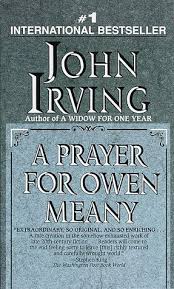A Joke Disguised as a Rant
 Irving, John (1989). A Prayer for Owen Meany. 617 pp.
Irving, John (1989). A Prayer for Owen Meany. 617 pp.
Secondary character John Wheelwright narrates the story of growing up with his friend, main character Owen Meany, a small boy who only grew to 5 feet in adulthood. In small-town New Hampshire, the children make fun of Owen because of his short stature and his high-pitched, always-screaming voice. In the school play of the nativity, Owen plays the baby Jesus. During the humorous fiasco that ensues, he claims to have glimpsed a tombstone with his name and date of his death on it. He immediately believes he has received a vision from God and is God’s chosen instrument. Later, he has a dream in which he envisions the circumstances of his death, which he believes also is a revelation. For the rest of the book Owen pontificates to everyone about destiny and fate and God’s will.
Another storyline setup is that, as children, in a baseball game, Owen hits a line drive that accidentally strikes John’s mother in the head and kills her. Everyone agrees it was a freak accident, but after that, Owen becomes dedicated to helping John, in school and in understanding life as Owen sees it. The incident is reminiscent of the opening car crash in The World According to Garp – a bizarre, low-probability accident that means nothing but sets characters on their psychological journeys.
A third early setup is that John doesn’t know who his father is. His mother became pregnant on a trip to Boston, but would never reveal who the father was. So throughout the book, John is on a quest to learn the identity of his father. That arc is perhaps supposed to parallel Owen’s quest to learn if he really is a chosen instrument of God, but if so, it is a weak and gratuitous story thread.
The narration is divided between an older John, around thirty years old, living in Toronto in the 1980s, a teacher of Canadian literature and virulent critic of American foreign policy, and who reminisces about growing up with Owen in the 1960’s, through grammar school, high school and college. The inclusion of the older narrator does allow a mature, reflective voice to describe the childhood events, which otherwise would have to be described in a child’s voice, but that older narrator is overblown with long digressions into the morality of Ronald Reagan’s involvement in the Iran-Contra scandal, which adds many ranting pages that do not serve the main story line. Maybe the idea is that if you’re politically powerful enough, you can make your own morality, as opposed to Owen, who must follow his destiny, but if that was the point, it was not made economically. The book could have been trimmed of 200 pages without loss.
There is plenty of political ranting about 1960’s-era politics as well, such as criticism of the Vietnam anti-war movement as self-indulgent and hypocritical. Owen believes he is destined to serve in Vietnam so he joins ROTC and becomes a lieutenant in the army. Again, the political diatribes seem to serve little purpose except to establish that Owen is skilled at rationalizing world events to fit his moral rigidity.
In the end, Owen is killed on the day he had foreseen, in a bizarre and not-believable event occurring in Arizona, not Vietnam. Author Irving contrives to reveal the meaning of Owen’s destiny in his final scene – his short stature, high voice, prefigured death – all conspire to “prove” that Owen’s was, after all, a seer and chosen instrument of God. That ending can be read as a self-referential joke on the process of writing, since obviously, an author can make anything mean anything in a fictional work, but by telling the story through John’s “realistic” narration, the strong context at the end leads to, “OMG, Owen Meany really was chosen!” Given Irving’s ironic sense of humor throughout the novel, I believe the main story of Owen Meany is intended as a wry joke, a parody of blind religious faith. Most reviewers of the book take the spiritual message literally, but that is the heart of the joke, after all.
